Inas Halabi: We No Longer Prefer Mountains
–
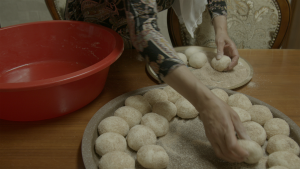
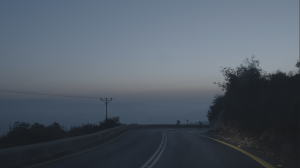
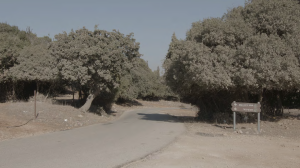
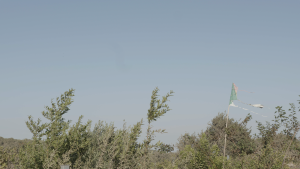
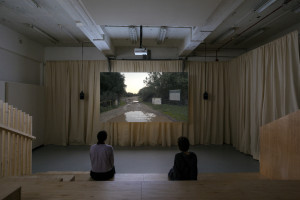
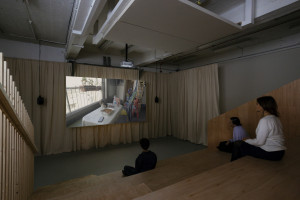

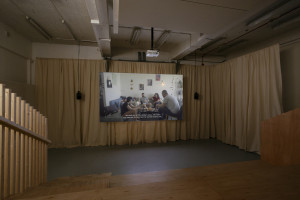
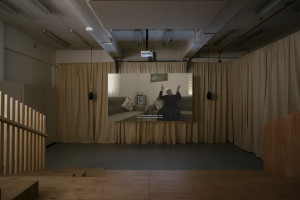
Downloads
We No Longer Prefer Mountains was the first solo exhibition in the UK by artist Inas Halabi.
The exhibition was a major new installation in which Halabi reflected upon the particular political and social condition of the Druze community living in occupied Palestine, taking individual and personal stories as a point of departure.
We No Longer Prefer Mountains began with an ascent of Mount Carmel upon which the Druze towns of Dalyet el Carmel and Isfiya are located, drawing the viewer into a world of geographic isolation and a locale shaped by coercion and control. Living mostly in mountainous areas in Lebanon, Syria, Jordan and Palestine/Israel, as well as in diaspora globally, the Druze maintain close-knit social and religious ties as a minority within and across national borders.
Weaving together intimate engagements with members of the community in shared domestic spaces and outdoor environments, the exhibition explored how the inner politics of the Palestinian Druze have been reshaped as a result of the establishment of Israel in 1948; whilst opening up possibilities for imagining alternative futures.
What can a camera, filming a landscape, reveal about the social and political structures of a given place at a given time? We No Longer Prefer Mountains is unscripted and through open, one-to-one exchanges often spoken directly to the camera, the project’s protagonists share their lived experience of the policies that the State of Israel has implemented towards the Druze. The exhibition was structurally inspired by Japanese avant-garde filmmaker Masao Adachi’s idea of fukeiron – or ‘landscape theory’ – which posits that the filming of everyday landscapes can reveal the forces of oppression that underpin one’s socio-political environment. In this way, the mountain itself also becomes a protagonist of the video, which poetically gestures towards the interdependencies between all living entities in the landscape, including flora, fauna, land, air and water where ecologies are also subject to the effects and impacts of colonial infrastructures.
Through narrations of experience across generations, the exhibition critically explored the ways in which national policies have systematically sought to reconfigure and reconstruct Druze identity; driven by the Zionist strategy of divide and rule. We hear how, in the mid 1950s, Druze leaders aligned the community within the State of Israel; however not all identified with this position, and increasingly a younger generation now contest it.
Protagonists therefore share perspectives on Druze mandatory conscription into the Israeli army; a direct result of that deal. Or how, since 1948, the annual pilgrimage route to the significant Druze shrine of Nabi Shu’ayb has been cut as it became no longer possible for Druze communities beyond Palestine/Israel to cross borders from Syria, Lebanon and beyond. Until recently, the shrine has been designated by the Israeli military as a site for swearing-in Druze men into the army, thereby transforming a key religious marker into a national one. We later hear how, in 1976, the Israeli Ministry of Education separated Druze education from Arab and a parallel curriculum was prepared; where the aim of this strategy was to erase the cultural and national identity of the Druze while constructing a new identity for them that was Israeli, rather than Arab or Palestinian. In 2018, the Israeli parliament approved the Jewish Nation-State Basic Law, which enshrines Jewish supremacy over Palestinian citizens, regardless of their ethnicity. This law has further shifted the discourse within the Druze community, as it has clarified that no matter how loyal one might be to the State of Israel, they will never be equal to a Jewish citizen.
The organisation Urfod - Refuse and Your People Will Protect You relay shared lived experiences and intersectional forms of resistance amongst those who live on Mount Carmel and beyond. The exhibition joins them as they gather to organise from a flat in Haifa, where the camera acts at times as witness to their collaborative process towards effective structures of resistance and mutual support; and at others situates the viewer amongst the group, as if to complete a circle.
Nijmeh - a key protagonist and the mother of Maysan, who is a co-founder and active member of Urfod - opens up a central space in the exhibition to consider how care, expressed especially through her cooking to accompany their meetings, can disrupt the policies of divide and rule adopted by the State of Israel. At the end of the film, through a final descent from Mount Carmel, both literally and metaphorically Halabi attempts to bridge a gap or disrupt the separation that has been created between the Druze and other Palestinian Arabs since 1948. The exhibition sought to reflect upon the ways in which the colonial system – despite implementing different tools of the State in the mountain for the Druze compared to the valley in relation to the Palestinian cause -– is one and the same. By doing so, she creates space to imagine an alternative future.
We No Longer Prefer Mountains carried forward Halabi’s long-term and ongoing research into how historical and national narratives are constructed; and the impacts that overlooked and suppressed histories have on contemporary life. This is anchored around her interest in landscape and systems of power and control. The installation evoked the mountain as a main protagonist of the film, with the ascent and descent of the tiered seating structure echoing the ascent and descent of Mount Carmel which is so central to the film. The relation between sound and sight is an ongoing enquiry for Halabi, and the possibility of experiencing the sound of the film initially before seeing the projected image is important; whilst movement through the installation further reflects Halabi’s interest in ritual and processes of transmutation from one form to another.
This collaboration with Inas Halabi was initiated by Elvira Dyangani Ose as Director of The Showroom, 2019-21. The exhibition in 2022 is curated by Lily Hall and produced with The Showroom team Gabriela Salgado, Seema Manchanda and Oana Damir. The installation has been realised by technicians Elliott Denny, Ruth Angel Edwards, Jack Felgate, Alessia Franchi, Andy Healy, Paulina Michnowska, Adam Shield, Daniel Wilkinson and Lucy Woodhouse; and with thanks to Naz Balkaya, Vanya Cantone, Katherine Finerty, Catherine Herbert, Corie McGowan, Campbell McConnell, Natasha Smith Tebbs, Allan Struthers, Raul Muñoz de la Vega, and the team at Mophradat.
The exhibition was generously supported by the Mondriaan Fund and The Embassy of the Kingdom of the Netherlands. The Showroom is supported using public funding by Arts Council England.
Film credits
Camera: Ashraf Douwani, Inas Halabi
Colourist: Daniel Donato
Editing: Inas Halabi
Editing Consultant: Sabine Maas
Production Assistant: Aline Khoury
Sound Recording: Sarouna Mushasha
Additional Sound Recording: Aline Khoury, Dima Halabi, Inas Halabi
Sound Design and Mix: Rob Walker
Music: Outside the Furrow /خارج التّلم by Maisan Hamdan, produced by El Rass
The Ethnicity Law (Jewish Nation-State Basic Law) قانون القومية by Darbet Shams
The film was produced with additional support from the Mondriaan Fund and AFK (Amsterdams Fonds voor de Kunst).
Special thanks to Nijmeh Hamdan, Kamal Kayouf, Najib Sarhan, Fahmi Halabi, Quftan Essami, Sheikh Said Sitawi, Urfod team (Hanan Wakeem, Maisan Hamdan, Hadiyeh Kayouf, Khaled Farrag, Hamoudeh abu Reesh), Darbet Shams band (Hanan Wakeem, Hisham abu Jabal, Haiman Suleiman, Samer Asakleh), Ala Younis, Maaike Gouwenberg, Elvira Dyangani Ose and Monika Szewczyk.
Inas Halabi, We No Longer Prefer Mountains was generously supported by Mondriaan Fund and the The Embassy of the Kingdom of the Netherlands. The Showroom is supported using public funding by Arts Council England
We No Longer Prefer Mountains is part of The Consortium Commissions, an initiative of Mophradat. Every two years, Mophradat creates a network of international collaborating partner institutions that collectively select, produce and present ambitious new artworks by artists from the Arab world.
The second exhibition of Inas Halabi ’s new work will be presented by de Appel, Amsterdam, The Netherlands, in Spring 2023.